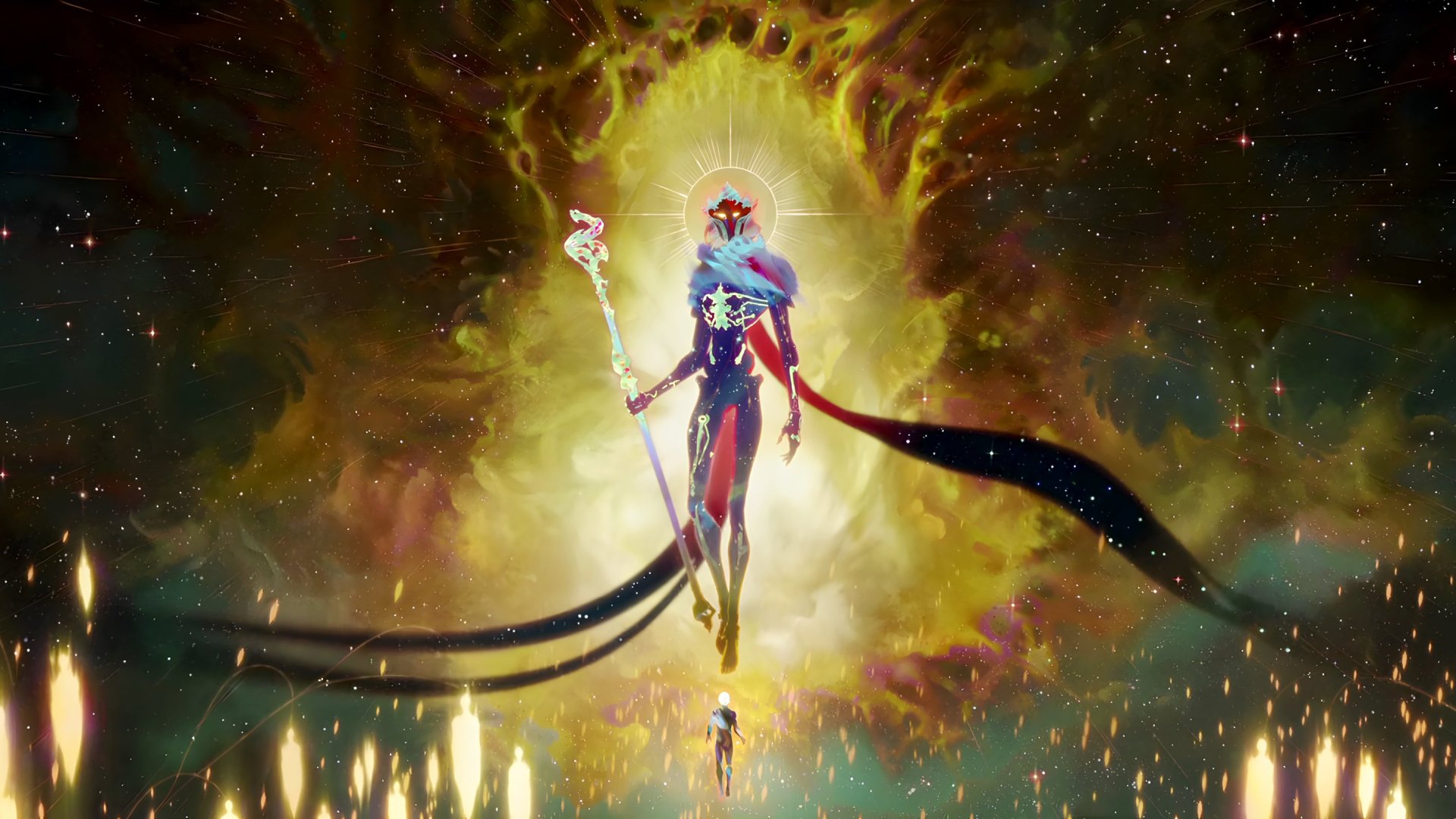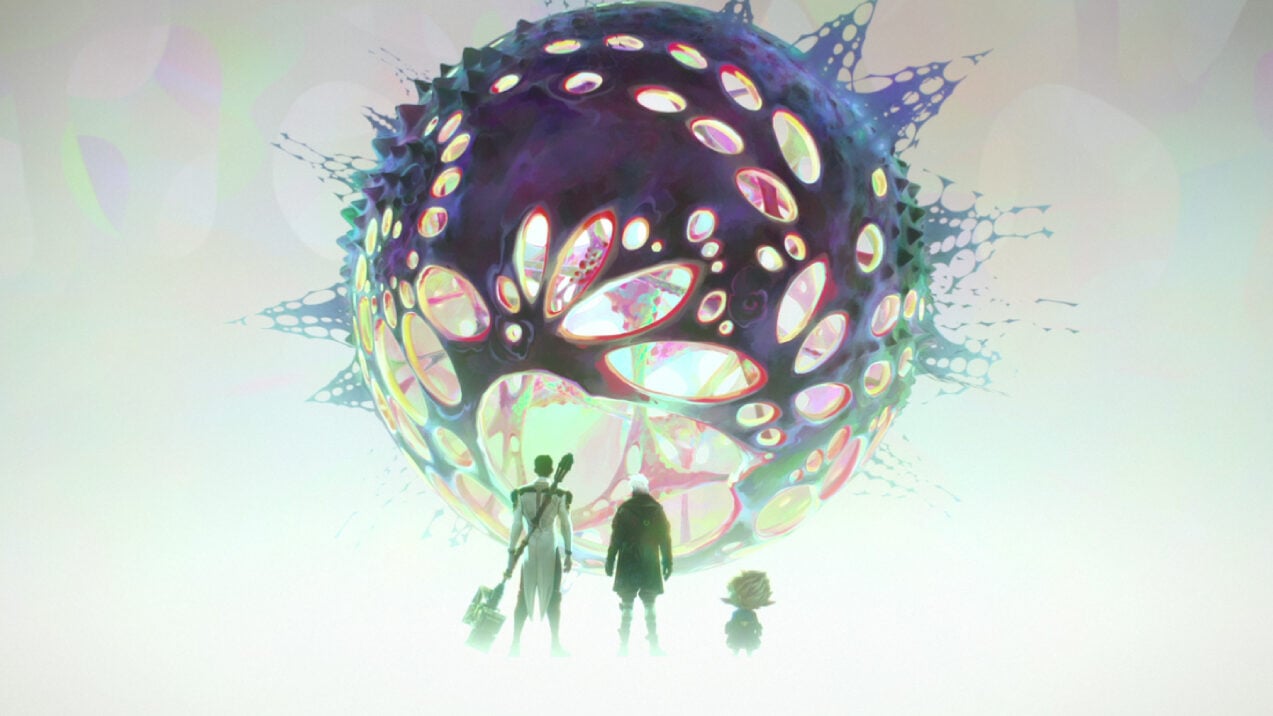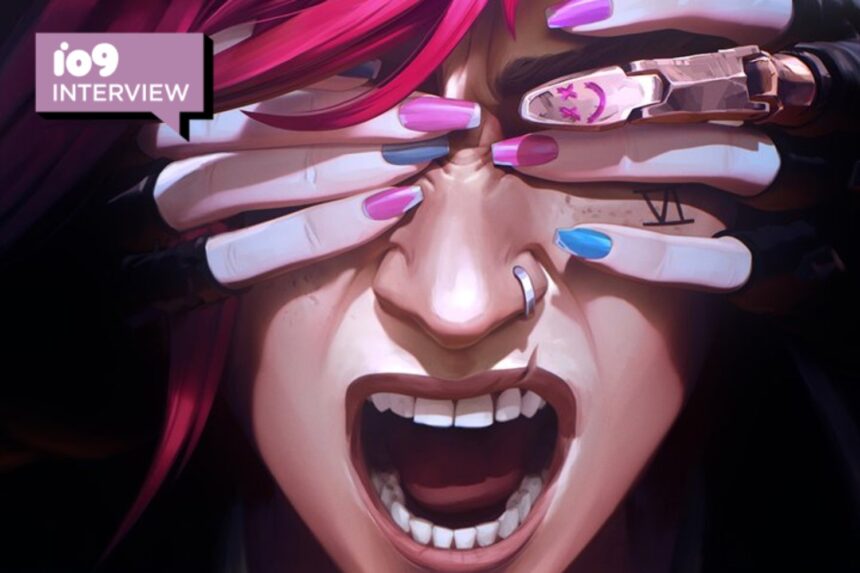Riot Games and Fortiche’s second and final season of the League of Legends animated show, Arcane, is not only on the fast track to becoming a part of the pantheon of phenomenal video game adaptations, it’s also a big win for the game company behind it. While fans only get to see the end result of Riot Games and Fortiche’s collaboration, they don’t often get a glimpse into the workflow behind the scenes.
In that spirit, we had a comprehensive sit-down with Riot Games co-founder Marc Merrill to discuss Arcane‘s impact on the company. We also talked about how Riot plans to balance its roles as a game developer and entertainment studio, how it intends to maintain sustainability following recent layoffs, and concerns regarding how AI’s potential aligns with its mission-driven approach to providing players and fans with a worthwhile experience.
The following interview has been edited for brevity.
Isaiah Colbert, io9: What has Arcane meant to Riot Games as its first foray into the entertainment industry?
Mark Merril: If we define entertainment as linear media—TV, film, etc.—then Arcane would be our first foray. To us, it’s been a bit of a dream come true. So many of us at Riot have been working on these characters and building this world—often behind the scenes—for 18 years. We always dreamed that these characters were real and from a real place. Rioters have always been trying to respect who these characters could be—that sort of emotional relationship that our players have developed with these characters over the years.
Arcane represents this opportunity to bring people into this world, to see what we all dreamed about and hopefully enjoy, share in, participate in, and realize it in the incredible way we’ve been able to do. Seeing the player response and the broader fan response for Arcane has just been rewarding, gratifying, and validating for all the hard work writers have put in for many years.
Of course, great recognition for our writers and Fortiche, our incredible partners—such incredible animation talent. It’s been a great milestone for Riot to reflect on the broad capabilities we’ve cultivated over many years. The power and magic that could be unlocked when we can bring something to bear like Arcane. That really helps realize the potential and do justice to the incredibly high player expectations we’re trying to meet.
io9: Were there any doubts that the show would be as successful as it was first announced?
Merril: I think we’re always nervous, right? We never quite know when we’re bringing something to bear. We think it’s cool, and I think different people can have various levels of optimism about different things. But I think it’s safe to say that nobody anticipated the level of positive response that has happened. That’s been really exciting and validating as a game company for this thing that we all love, and for many League players worldwide.
io9: Before the premiere, incomplete episodes of the second season leaked online. How did everyone at the company react? Did they see fans rally to prevent the leaks from spreading?
Merrill: We all thought it was super cool to see fans rallying to help mitigate the leaks. I think it’s a testament to their love, respect, and appreciation for the hard work that everybody puts in and how they wanted to not spoil it for themselves. It’s better seeing it with fresh eyes, without watermarks, and on a big screen with great sound.
As a company that operates a bunch of live service online games, 24/7, 365 in many countries all over the world, we’re used to having lots of things go wrong all the time in different areas. We kind of all took it in stride. It wasn’t a leak from one of our vendors. It was a leak from one of our partner’s vendor, and those things happen. This doesn’t mean that there isn’t anything to learn. You can’t bat 1,000 on everything. So it was all about what can we do to help mitigate and it was just really gratifying to see players be on our side with that. I think it’s a good reinforcement that, if you respect people and try to do justice to make something great, they’d want that, too.
https://t.co/7YKKAqT1sL
— Riot Games (@riotgames) December 3, 2024
io9: Arcane is touted as one of the best video game adaptations for its ability to immerse viewers into its world without requiring them to have played the games beforehand. This, in turn, has led to a community meme where players advise Arcane fans not to play League of Legends and stick to the show so it doesn’t consume their lives. Was that ever the goal for Riot, to lead to more League of Legends players?
Merrill: Not in a one-to-one fashion. We expected that if we did a great job, League players would feel pride and a deeper attachment. We see that manifest in play rates, enthusiasm, and willingness to share. We thought if we did a great job, other people would become fans of the IP and be curious. Some people would make it into League, or to [Team Fight Tactics], which had the Arcane set, or Wild Rift, or, if they play Valorant, maybe they’d want to go check out the Vi gauntlets we put in because we have this cool gaming ecosystem. But it’s not a requirement or why we made Arcane. It’s a benefit.
League of Legends and Valorant are competitive multiplayer online games that—unless somebody is motivated to play a game that has a really deep learning curve, a really high skill ceiling, is really mastery-oriented, and really competitive—they’re not going to like it. That doesn’t mean that’s because the game’s bad, right? The game is what it is. Just like [how] not everybody wants to go play American football, right? Some people want to watch it. We view it like that.
Over time, we’ll hopefully have some games where people can run around the world of Runeterra in different ways, or we satisfy some different player motivations other than deep competition, mastery, and things like that. When that happens, we think there are potentially a lot of people who have fallen in love with some of these characters and would want to go play those things. That would be great, but it’s a bonus. It’s not why we did it.
the cast of #Arcane reads fandom brainrot pic.twitter.com/CrblGiLqyb
— League of Legends (@LeagueOfLegends) November 27, 2024
io9: Has Arcane’s presence led to an influx of players similar to Netflix’s Cyberpunk: Edgerunner’s anime with Cyberpunk 2077?
Merrill: Yeah, we have. There’s definitely a spike in trials, or people coming back to the game in different ways because they get excited. Play rates spike for champions that appear in Arcane because people are excited and have an emotional relationship with these characters and then want to play them. So that happens. But I do think, from a broad audience perspective, a game that is more exploration-based and/or more broadly accessible is the type of game that will typically benefit more from that type of excitement spike.
io9: In November, Variety released a report claiming Riot Games spent $250 million, making Arcane the most expensive animated show ever. You’ve since then released a comment rebuffing the article’s claim that the staggering budget was a sign of the company’s inexperience in the entertainment industry and progressed deeper into it outside of Arcane as silly, saying the budget shows the studio did so to pay artists their worth. Was the show’s budget ever a point of contention while making the show, or was it set in stone before its development?
Merrill: First of all, the $250 million headline is not even accurate because that includes marketing expenses. The actual creation budget is significantly less than that. One of the fascinating things is that once a meme sets into people’s heads, showing up with facts counter to that narrative, it’s sometimes hard to dislodge a perspective, which is just fascinating to observe. It wasn’t quite $250 [million]. It was significantly less than that.
The way we think about investment and budget allocation, like the budget to make [Arcane], is all oriented towards beautiful, hand-crafted, incredible animation, voice acting, storyboarding, and writing. It’s all made by hand by incredible creators—an army of them. We think that it is incredibly worth it. Whenever we’re making a budget, whether it’s for a game or anything else—movie, esports event, TV show, etc.—the budget is a downstream step.
First is, what are we trying to do? Who’s the audience? And what do they need? Once we have this definition or a clearer resolution of what we’re trying to do, we have assumptions about what a thing may cost. But those are assumptions. Then we go on the journey to try to make this thing. We take two steps forward and one step back and learn. As we learn, we get more accurate in understanding what it’s actually going to take, which then helps inform the cost; we need all these other types of expertise. There’s always this continual assessment of whether this makes sense, what we are doing, and whether we are making the right amount of progress. That’s true all over the place.
We’re not this finance-led, cost-accounting-oriented business regarding how we drive decisions. We’re a mission-driven company. We’re here to make it better to be a player. We are trying to build a few things that are incredibly special and cool for a specific audience.
Whether that’s League of Legends, Valorant, TFT, Wild Rift, or Legends of Runeterra, why we do esports the way we do, why our games are free, why we make all the incredible music we do, and how we think about it, and why we build Arcane. It’s trying to enhance the value of being a player and to do something worthy of their expectations.
What’s cool is that we also have a business model aligned with when we do something great; if people love it, they may want to spend some money on it. Our interests are aligned with that of our players. We’re only rewarded if we do a great job. I think that’s a healthy feedback loop, because nobody ever hasn’t spent any money in our games. For Arcane, yeah, you had to get a Netflix subscription, which is pretty accessible to tons of people.
Our goal was to do something great to make our players proud, hopefully, expose a broader audience to these characters in this world that we love so much, and tell a great story that people attach to. Because we achieved that, we’re all incredibly thrilled about it.
io9: Are you comfortable with ballparking what the actual budget was for Arcane?
Merrill: I’ll give you a ballpark range. It’s somewhere between 60 to 75% of that estimate.

io9: Do you think Riot Games’ budget for Arcane should be seen as an aspirational industry standard, or is it solely the price the company was willing to pay to ensure the show would be a great success?
Merrill: We honestly have never thought at all about what everybody else is doing in animation or film except from the perspective of what are players’ expectations and how we do something that will make them proud and excited. Other companies make a lot of great stuff and do it the way that makes sense for them. Awesome. We’re not trying to change the animation industry in any profound way. The goal is to do something great for an audience.
io9: At this point, does Riot Games consider itself a media studio and a game developer in equal measure or do the scales tip more toward the latter camp with other projects coming down the line?
Merrill: No. We haven’t changed at all. Riot is the exact same as we were from when we started. We don’t define ourselves based on games, entertainment, eSports, music, or anything. We define ourselves based on the audience that we’re trying to serve. We serve the most passionate players in the world and we will do anything to make it better to be a player. Whether it’s, again, games, business models, publishing all over the world, music, animation, community, or live events. That’s what we do.
io9: Was crunch an issue between Fortiche and Riot Games when getting the show out? If not, how did the two collaborate to prevent it?
Merrill: From my perspective, it never became an issue. There’s a lot of detail around planning a season, resources, what to cut, what must be true, [and] what to optimize. There are always trade-offs. Riot has hundreds of artists who paint all day and engineers who write code all day. Our people are our most valuable asset. The people who do the real work are those on the front lines who make stuff, so our job as leaders is to help our incredible people make incredible things and focus on the high-value opportunities that will be worth it and awesome.
Throwback to one of the most iconic scene of ACT III.
No fewer than 56 talented people worked on this sequence, which we’re sure will become iconic. Big thanks to all our departments and all the lovely people who had contributed to this piece of art!#fortiche #fortichers pic.twitter.com/NWNrYT7ucI
— Fortiche prod (@ForticheProd) December 5, 2024
Fortiche very much shares that philosophy. We have the financial health as a company to think about things from a long-term perspective and recognize that talent is the most important thing. Great teams make great products, and we try to optimize for that. That philosophy informs how we work. It doesn’t mean we have it perfectly dialed. It means we have to learn when we’re taking on new tasks. We must figure out how to get it right, but we can iterate and learn as we go.
io9: Arcane’s success isn’t the only thing that’s had Riot Games make headlines. The company also saw mass layoffs this year, totaling 530 employees. You’ve spoken previously about the layoffs, saying they were made to ensure the company has the right expertise so League can continue for another 15 years. What have you learned about trying to grow beyond League of Legends, and how will those lessons help Riot evolve sustainably?
Merrill: In an ideal world, that never should have happened. It’s an example of when Riot got aggressive from a growth perspective and wanted to expand widely, to do lots and lots of things without sufficient attention to talent density, systems, and what products are the right ones. Some of that is derived from a belief that making great things is easier than it actually is. Hopefully, as the company has gone through the chapter, we’ve all learned how to create the conditions for that to be unlikely to ever happen again.
io9: How has the company’s reset affected the ongoing development of Riot Games’ League MMO?
Merrill: The reset has dramatically increased the likelihood of success. I fundamentally believe in the Ed Catmull [quote] where he said, “You can give a great idea to a mediocre team, and they’ll make it mediocre. You can give a mediocre idea to a great team, and they’ll make it great.” We must ensure we have great teams with great vision, perspective, and direction. And if that’s not true, then our ability to make something worthy of the high expectation of our audience is pretty much zero. There’s so much content in the world: social media content, incredible stuff all over streaming, tons of games available, and much of the world doesn’t need more mediocre stuff. It needs great things.
Riot needs to be focused on making a few special things that are great. That starts with people and team, direction and alignment around that particular strategy, and what must be true to deliver that. We’re in the [fortunate] position because of the incredible games that we’ve created so far, this massive community that we have, and this incredible IP that we’ve been investing building for 18 years, people want to run around the world of Runeterra. We do, too. We take the responsibility very seriously to deliver something great and worthy of our expectations—and everything happening, including that pivot and direction and reset, is oriented to be able to try to deliver on their expectations.
celebrate the final chapter of the Arcane Collector’s Set before it leaves your shop. pic.twitter.com/xbRVYOUBGy
— VALORANT (@VALORANT) November 23, 2024
io9: So many game developers are trying to carve out new live service niches and failing. Why did Valorant succeed and would that even still be possible if it were launching today?
Merrill: The way we think about creating anything new, including Valorant, is we identify a particular player need, then try to put together a team that needs to deeply relate to that player need and then be incredibly willing to make all the million small decisions necessary to bring that thing to life. That is a bar that moves every year, not just based on what we do, but on whatever everybody else does. We have to calibrate constantly. That’s how we think about everything, including Arcane and Valorant.
As the world continues to evolve, there’s more great things available [and] player expectations going up. Competition benefits the consumer, and our goal is to make it better to be a player. When other companies do great things, we’re thrilled. Then we’ve got to up our game. Necessity is the mother of all invention. That creates the conditions for us to push ourselves and figure out what else can we do.
Everybody thought it was insane that we were a game company that then made a multiplayer-only game, and made a publishing business and took it directly to the consumer ourselves, and then expanded around the world, made music, built esports, and now do our Arcane. All of that innovation is driven from that exact same perspective. We’re never done but there’s tons of opportunity, and we’re just limited by our capabilities to dream and deliver.

io9. There’s been a rise in concern, whether it be with League players or Arcane fans, witnessing the games industry posting job listings for people to make generative AI. Especially when those game company’s hallmarks are based on imbuing the human element into their art direction. Looking forward, what should newfound fans and longtime players kind of expect of Riot Games’ philosophy over procedural and generative AI to build that future that Riot is trying to make?
Merrill: AI is not only going to disrupt and impact our industry, but it’s going to change the world. There’s a lot of questions and unknowns about how significant that impact will be, but I think it’s safe to say that it’s going to be significant. As it relates to how we think about it from a game standpoint, I think there’s two really exciting opportunities.
One is a category around developer workflow improvements. Which is, “Hey, I’m an engineer, and all of a sudden, I can automate a bunch more stuff than I could do before and get some code generation assist.” Or, “I’m a designer, and rather than writing a bunch of error-prone Lua scripting to make an ability, I can just write a tooltip, and then it magically works in-game. So then I can iterate on is this fun and spend a lot more time my time doing that.”
I think there’s a whole category of gen AI that are great productivity enhancements, that enhance the value of creative talent to be able to do more and do better. I think that’s generally great. Do I think that like generative AI is going to take the place of human judgment or taste and quality in the next decade? No, I do not.
Then there’s a category that is around novel game experiences: new capabilities that are going to be unlocked as a result of this cool new technology existing. There’s a whole bunch of exciting stuff available there that wasn’t available before. League of Legends is a sport. What if you had a personalized coach that could tell you how to do a lot of stuff in the game as you’re learning? I could give you dozens of use cases and examples that are really exciting. From our perspective, we see a lot of opportunity to make it better to be a player. But again, because people are also the most valuable asset to the business, we see the opportunities around enhancing the productivity and creativity of our incredible people to do more and do better stuff.
All episodes of Arcane are streaming on Netflix.
Want more io9 news? Check out when to expect the latest Marvel, Star Wars, and Star Trek releases, what’s next for the DC Universe on film and TV, and everything you need to know about the future of Doctor Who.
Read the full article here












